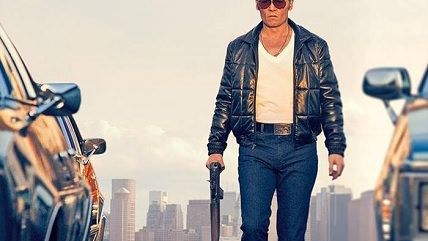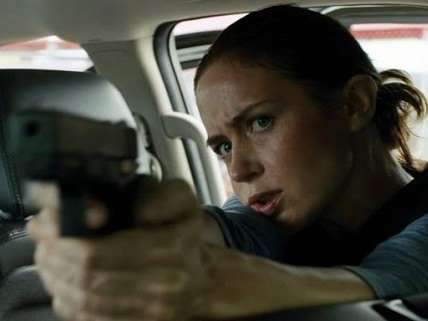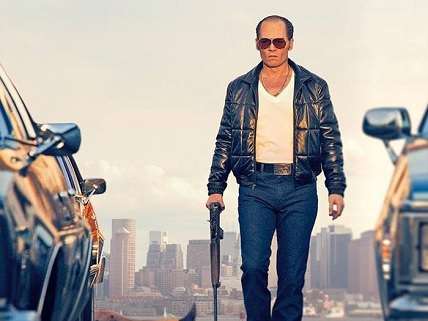Movie Reviews: Sicario and Black Mass
Emily Blunt and Benicio Del Toro take on the drug cartels and Johnny Depp bids for a comeback.


In Sicario, the never-ending War on Drugs is presented in all of its pig-headed futility. The movie gets off to a ghastly start in the Arizona desert, where an FBI SWAT team is converging on a safe house belonging to a transnational Mexican drug cartel. Inside, they find dozens of rotting corpses boarded up behind the walls, their heads wrapped in suffocating plastic sheets, their bloody faces frozen in agony. It's a horrific scene, and it sets the nightmarish tone for everything that follows.
Emily Blunt plays Kate Macer, one of the agents taking part in the raid. Kate and her partner Reggie (Daniel Kaluuya) are the only two honorable characters in the film—everyone else is either ethically compromised or completely corrupt. As a seasoned field operative, Kate is recruited to join an inter-agency strike force that's been formed to take down a Mexican drug underboss named Diaz (Bernardo P. Saracino) and his kingpin overlord Alarcon (Julio Cedillo). But from the start Kate realizes that something's not right. Her new group is led by a shifty character named Matt (Josh Brolin), purportedly a DoD "adviser" for the mission, but more likely something else. Also hanging about is a mystery man named Alejandro (Benicio Del Toro), a Colombian national whose role in the operation goes unexplained. When the strike team sets up in El Paso for a border-crossing raid into nearby Juárez, Kate objects to the plan's blunt illegality. But she wants to know who these people really are, and who is allowing them to do what they're doing. And so she goes along.
Director Denis Villeneuve, who waded into similar moral murk in the 2013 Prisoners, maintains a masterful balance between scenes of brutal violence and interludes of deepening ethical ambiguity. Teaming once again with the great cinematographer Roger Deakins (nominated for an Oscar for his work on Prisoners), Villeneuve presents the sun-blasted border drug lands as a metaphor for the parched integrity of everyone we see passing through it. And he heightens the picture's ominous mood with a churning score by Icelandic composer Jóhann Jóhannsson, a specialist in pressure-cooked electro-turmoil.
The viciousness of the drug cartels is always clear (a passing shot of mutilated bodies hanging from an urban overpass concisely demonstrates their gruesome terror tactics). But the U.S. strike team has nasty techniques of its own: "If you try anything," Alejandro tells one captured cartel member, "your daughter will be violated by twenty men."
The movie is a showcase for Blunt, who is both emotionally affecting and athletically adept. In Kate's sparse private life she's a lonely divorcee, and when she makes an unwise connection with a local cop in a country bar, the resulting scene in his apartment provides a slam-bang action highpoint. Also at his best is Brolin, whose smirking malevolence is consistently unnerving. But as is so often the case, the movie really belongs to Del Toro. Alejandro's air of heavy sorrow (we learn that he's suffered a heart-ripping loss at the hands of cartel murderers) and his penchant for instant, unbounded violence infuse the picture with a haunting moral complexity.
The movie delivers a familiar message: the Mexican cartels are sustained by the booming market for illegal drugs north of the border. (Although when one cartel chieftain asserts that the gangs learned their hideous practices from their U.S. antagonists, it doesn't ring true—the cartel killers clearly have an innate depravity that's all their own.) As an increasing number of North Americans have come to realize, the War on Drugs has corrupted everyone drawn into it; and the movie offers no hope that it can ever be won, or that the corruption won't continue to metastasize. When Kate argues that the strike team's actions are legally out of bounds, a superior sets her straight: "The boundaries have been moved," he says. And will clearly continue to be.

Black Mass
After years of dumb movies—most recently the near-career-killing Lone Ranger and the wretched Mortdecai—Johnny Depp makes a strong bid for redemption (and maybe Oscar consideration) with Black Mass, a dark and violent biopic about the psychopathic gang leader James "Whitey" Bulger, who ruled the Boston underworld with a bloody fist from the 1970s into the mid-'90s. To play this notorious character, Depp has been fitted out with a balding prosthetic pate, wintry contact lenses and a fake dead tooth in the middle of his snarl. It's a serious left turn for the actor, and he totally commits to it—he really is impressive. If only that were enough.
Bulger's story is framed by a series of interrogations of his henchmen, who are turning state's evidence against him. These gangland insiders have alarming stories to tell, and the director, Scott Cooper (Crazy Heart, Out of the Furnace), doesn't hold much back. We see Bulger viciously beating his associates, and shooting them in the head; and in one electrifying scene we see him grabbing the throat of a young prostitute (Juno Temple)—the camera turns away, but we hear at length her horrible, gurgling death.
At the heart of the movie is an unbreakable bond among three men: Jimmy Bulger (no one dares use his nickname, Whitey, to his face) and his brother Billy (Benedict Cumberbatch) and their childhood friend John Connolly (Joel Edgerton). Billy is now a Massachusetts state senator, and Connolly has grown up to become an FBI agent. Nevertheless, they all continue to gather for Christmas dinners and friendly hangouts, at which the subject of Jimmy's savage criminal activities is never broached.
Seeing a way to advance his career, Connolly asks Jimmy to become an FBI informant. Jimmy unexpectedly agrees to do so—but only because he sees it as a way to manipulate the feds into cracking down on his hated rivals in the city's Italian mob. In return for his snitching, he'll be allowed to carry on as usual—as long as he, like, stops murdering people. This scheme at first works well for Connolly's purposes—before his FBI superiors (Kevin Bacon and Adam Scott) begin to grow suspicious about his relationship with Bulger. When a new, straight-arrow chief (Corey Stoll) takes charge, and notices that Bulger has never been busted for his many crimes, Conolly's edifice of deceit begins to crumble.
The movie is filled with terrific actors, especially Dakota Johnson as the mother of Bulger's son; David Harbour as a bent FBI agent; and Peter Sarsgaard, Rory Cochrane, and Jesse Plemons as members of Bulger's Winter Hill Gang. But the picture, which is swaddled in mournful cellos, is unremittingly grim, and its emphasis on the gangsters' shared Irish blood and the iron loyalty it dictates inevitably recalls Martin Scorsese's Goodfellas. (Jimmy loves his mom, the gangsters talk food, there's a Pesci-like faux flip-out.) But Goodfellas is a much richer and more enjoyable film. There's no passing charm in this movie, and virtually no character detail. The real Whitey Bulger—currently serving two life sentences in prison—is simply loathsome. And while Depp's portrayal of him is powerfully focused, it's essentially—maybe unavoidably –one-note. What should we feel about this monstrous character? At the end we feel nothing at all.
